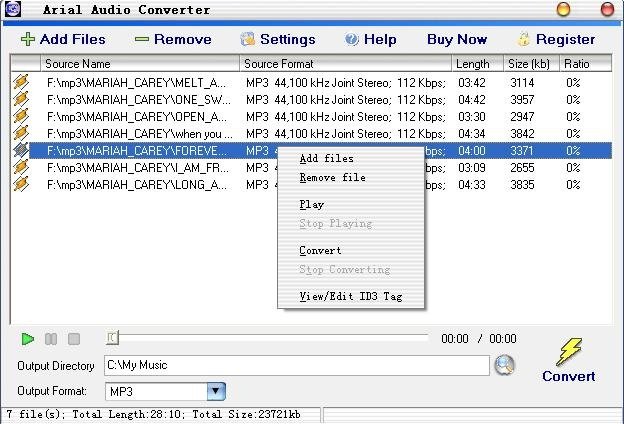
Once done, you will have m4a files available in the same folder. Now save the file and double click on it to execute the file. for /f %%a IN ('dir /b *.ogg') do call "C:\Programs\ffmpeg\bin\ffmpeg.exe" -y -i %%~na.ogg %%~na.m4a Command File “convert.bat”Ĭreate a new bat file called “convert.bat” in the folder where you have all the ogg files.Ĭopy the following content and paste it into “convert.bat” and save the file. In my example, I am using Windows machine and Windows batch file.Īssume that ffmpeg executable is available at C:\Programs\ffmpeg\bin\ffmpeg.exe after install. You should have ffmpeg installed on your computer. In fact, you can convert any audio file formats to any other format using a DOS bat file. I have found a way to quickly convert all ogg files into m4a files. WAV files can be opened by almost all audio programs, mainly because they’ve been around for over thirty years and because they’re so widely respected.If you have a need to convert multiple *.ogg files into *.m4a files, it is not easily possible. Unsurprisingly, WAV files tend to be large in size because they’ve not been compressed in any way - they are typically over ten times the size of an MP3 file. WAV files are used by musicians to record music, with this format providing a much richer sound than other compressed file formats.

WAV uses PCM (Pulse Code Modulation) to encode the audio data by segmenting it into small pieces, and does so without any compression this means the process doesn’t impact the audio quality in any way. Part of the appeal of WAV files is that they’re exceptionally high quality because they are uncompressed and lossless. Despite being developed in 1991, it is still a popular file format today. The WAV file is one of the oldest types of audio file in existence today and was developed by Microsoft and IBM.

By comparison, an MP3 file is universally supported.Ī WAV file also goes by the name of a WAVE or Waveform audio file. One downside of an M4A file, especially when compared to an MP3 format, is that it can only be opened by iTunes or Windows Media Player version 12 and later.

As more and more music was consumed on the go via devices such as iPods and smartphones, the need for small file sizes became greater, which is why an M4A file has grown in popularity and importance.

M4A files tend to be encoded using an AAC codec and are small in size because they have been compressed - often providing a smaller file-size footprint than an MP3 file format, while mirroring, if not improving, the quality of an MP3 file. An M4A file is the go-to audio format for compressed audio, due to the creation and popularity of iTunes. It was developed by Apple, largely as a result of the popularity of the MP3 file. An M4A file format is also called an MPEG-4 audio file, and is an audio file saved in the MPEG-4 standard.


 0 kommentar(er)
0 kommentar(er)
